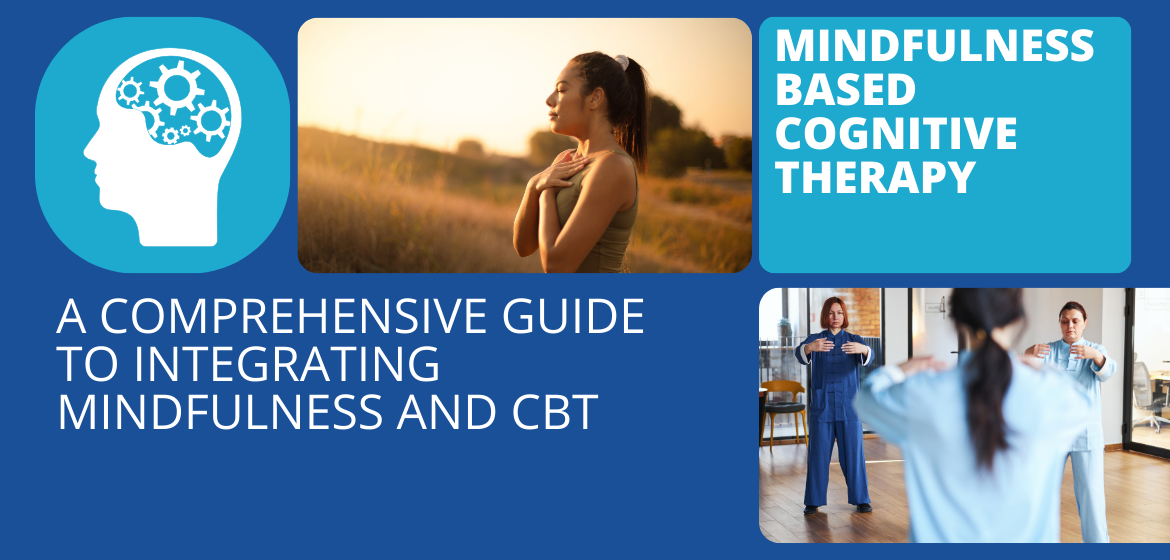
Mindfulness-Based Cognitive Therapy: A Comprehensive Guide to Integrating Mindfulness and CBT
Mindfulness-Based Cognitive Therapy (MBCT) is an innovative therapeutic approach that combines elements of cognitive behavioural therapy (CBT) with mindfulness practices. Developed to help individuals who suffer from recurrent depression, MBCT has been widely researched and has shown significant efficacy in preventing relapse. This article provides an in-depth look at MBCT, exploring its principles, techniques, and supporting research that underscores its effectiveness.
What is Mindfulness-Based Cognitive Therapy?
MBCT was developed by Zindel Segal, Mark Williams, and John Teasdale in the late 1990s. It integrates cognitive therapy principles with mindfulness strategies, which are derived from Jon Kabat-Zinn’s Mindfulness-Based Stress Reduction (MBSR) programme. The core idea is that mindfulness helps individuals become more aware of their thoughts and feelings in the present moment, thereby reducing the risk of being overwhelmed by negative thought patterns.
Principles of Mindfulness-Based Cognitive Therapy
The fundamental principles of MBCT include:
- Mindfulness Practice: Encouraging individuals to observe their thoughts and feelings non-judgmentally.
- Cognitive Awareness: Helping individuals recognize patterns of negative thinking that can lead to depression.
- Acceptance: Promoting an attitude of acceptance towards all experiences, whether pleasant or unpleasant.
- Behavioural Change: Encouraging actions that align with mindfulness and cognitive awareness.
Core Techniques in MBCT
MBCT involves a variety of techniques that are practised over an eight-week course, which typically includes weekly group sessions and daily home practice. The core techniques include:
- Mindful Breathing: Participants learn to focus on their breath to anchor their awareness in the present moment. This practice helps cultivate a state of calm and reduces the impact of stress.
- Body Scan Meditation: This technique involves paying close attention to different parts of the body in a sequential manner. It enhances bodily awareness and helps individuals connect with physical sensations.
- Mindful Movement: Incorporating gentle yoga and stretching exercises, mindful movement helps participants integrate mindfulness into physical activity.
- Three-Minute Breathing Space: A short, structured practice that helps individuals step out of automatic pilot mode and reconnect with the present moment. It is used to manage stress and emotional distress in daily life.
- Cognitive Exercises: Participants engage in exercises that help them identify and challenge cognitive distortions and negative thought patterns. These exercises are similar to those used in traditional CBT.
Efficacy of Mindfulness-Based Cognitive Therapy: Research Evidence
Numerous studies have demonstrated the effectiveness of MBCT in preventing relapse in depression and improving overall mental health. Below are some key findings:
- Relapse Prevention in Depression: A seminal study by Teasdale et al. (2000) published in the Journal of Consulting and Clinical Psychology found that MBCT significantly reduced the risk of relapse in individuals with recurrent depression. Participants who underwent MBCT were about 50% less likely to relapse compared to those who received usual care.
- Long-Term Benefits: Research by Kuyken et al. (2008) in the Journal of Consulting and Clinical Psychology showed that the benefits of MBCT extend beyond the initial treatment period. Participants in the MBCT group had significantly lower relapse rates and reported higher quality of life over a 15-month follow-up period.
- Reducing Anxiety and Stress: A meta-analysis by Hofmann et al. (2010) in the Journal of Consulting and Clinical Psychology found that mindfulness-based interventions, including MBCT, are effective in reducing symptoms of anxiety and stress. The study highlights that mindfulness practices can enhance emotional regulation and reduce the impact of stress.
- Improving Cognitive Function: A study by van der Velden et al. (2015) in the journal PLOS ONE found that MBCT can improve cognitive function, particularly in terms of attention and working memory. This suggests that MBCT not only helps with emotional regulation but also enhances cognitive performance.
How MBCT Works
MBCT operates on the premise that individuals who have experienced multiple episodes of depression are more vulnerable to relapse due to patterns of negative thinking. These patterns can be triggered by minor stressors and can quickly spiral into full-blown depressive episodes. By incorporating mindfulness practices, MBCT helps individuals break this cycle in several ways:
- Increased Awareness: Mindfulness helps individuals become more aware of their thoughts and feelings as they arise, allowing them to identify negative thought patterns early.
- Decentering: MBCT teaches participants to view their thoughts and feelings as temporary and separate from their identity. This process, known as decentering, helps reduce the impact of negative thoughts.
- Emotional Regulation: Mindfulness practices enhance emotional regulation by promoting a non-judgmental attitude towards all experiences. This reduces the tendency to react negatively to stressors.
- Behavioural Activation: By integrating mindfulness with cognitive techniques, MBCT encourages individuals to engage in positive activities and behaviours that align with their values and goals.
Want to Learn More about MCBT & CBT approaches?
Mindfulness-Based Cognitive Therapy represents a powerful integration of mindfulness and cognitive behavioural techniques, offering a robust approach to managing recurrent depression and improving overall mental health. Supported by substantial research evidence, MBCT helps individuals develop greater awareness of their thoughts and feelings, reduce the impact of negative thinking, and enhance emotional regulation. As mental health challenges continue to rise globally, MBCT provides a valuable tool for therapists and clients alike in the journey towards sustained mental well-being.
We are enrolling for the M.A. in Counselling & Psychotherapy (Cognitive Behavioural Modalities). The programme was developed due to the increasing and expanding demand for evidence-based practice using recognised modalities of Counselling & Psychotherapy. More fundamentally it also equips learners to respond to ever-changing social and cultural needs. You can learn more about this programme today.






















